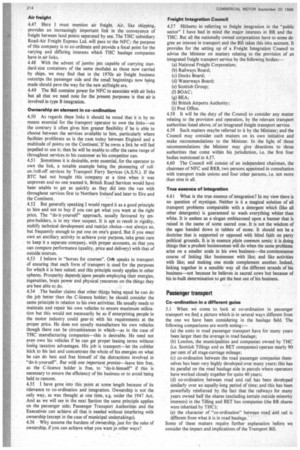Ownership an element in co-ordination
Page 218

If you've noticed an error in this article please click here to report it so we can fix it.
430 As regards these links it should be noted that it is by no means essential for the transport operator to own the links—on the contrary it often gives him greater flexibility if he is able to choose between the services available to him, particularly where facilities proliferate as is the case today between England and a multitude of points on the Continent:If he owns a link he will feel impelled to use it; then he will be unable to offer the same range of throughout services to his customer as his competitor can.
4,51 Sometimes it is desirable, even essential, for the operator to own the link, a notable example being the pioneering of rollon/roll-off services by Transport Ferry Services (A.S.N.). If the BTC had not bought this company at a time when it was unproven and no one wanted it, British Road Services would have been unable to get as quickly as they did into the van with throughout services first to Northern Irelandand later to Eire and the Continent.
4.52 But generally speaking I would regard it as a good principle to hire and not to buy if you can get what you want at the right price. The "do-it-yourself" approach, usually favoured by empire-builders, is in my view suspect. It is apt to result in rigidity, stultify technical development and restrict choice—not always so, but frequently enough to put one on one's guard. But if you must own an ancillary activity to achieve your purpose, take great care to keep it a separate company, with proper accounts, so that you can compare performance (quality, price and delivery) with that of outside sources.
4.53 I believe in "horses for courses". On! speaks in transport of ensuring that each form of transport is used for the purposes for which it is best suited; and this principle surely applies in other spheres. Prosperity depends upon people employing their energies, ingenuities, brain power and physical resources on the things they are best able to do.
4.54 The haulier claims that other thin'gs being equal he can do the job better than the C-licence holder; he should consider the same principle in relation to his own activities. He usually needs to maintain and repair his own vehicles to ensure maximum utilization but this would not necessarily be so if enterprising people in the motor industry could gear-in with his requirements at the proper price. He does not usually manufacture his own vehicles though there can be circumstances in which—as in the case of THC manufacturing companies—this is desirable. He need not even own his vehicles if he can get proper leasing terms without losing taxation advantages. His job is transport—let the cobbler Stickto his last and concentrate the whole of his energies on what he can do best and free himself of the distractions involved in "do-it-yourself". But with one important proviso—leave him free, as the C-licence holder is free, to "do-it-himself" if this is necessary to ensure the efficiency of his business or to avoid being held to ransom.
4.55 I have gone into this point at some length because of its relevance to co-ordination and integration. Ownership is not the only way, as was thought at one time, e.g. under the 1947 Act. And as we will see in the next Section the same principle applies on the passenger side; Passenger Transport Authorities and the Executives can achieve all that is needed without interfering with ownership (except in the case of municipal undertakings).
4.56 • Why assume the burdens of ownership, just for the sake of ownership, if you can achieve what you want in other ways?


















































































































































































































































































































































































